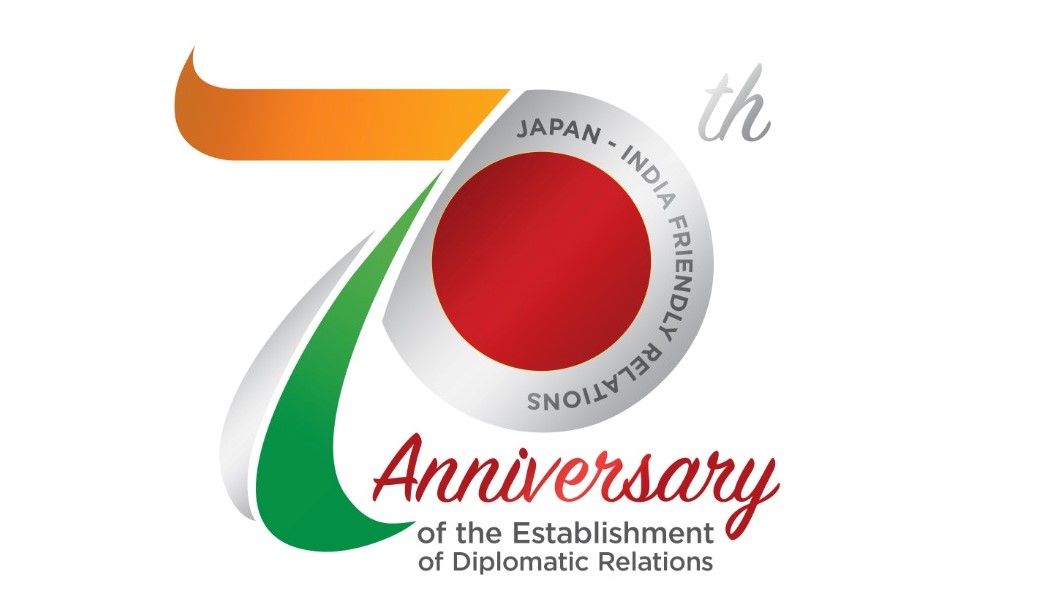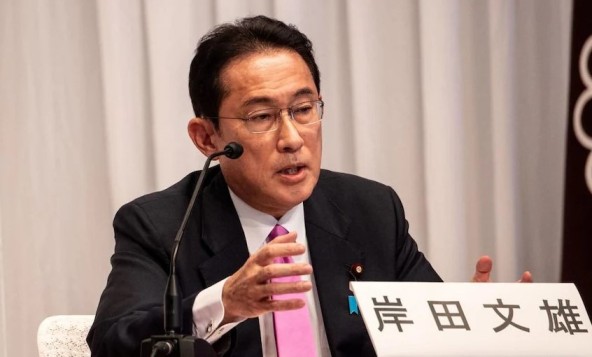April 28: It’s a BIG day for Japan and India, the two Asian superpowers
NEW DELHI/TOKYO: Today is a BIG day for Japan and India. On this day – exactly 70 years ago in 1952, the Treaty of Peace that was signed in San Francisco between the two nations on September 8, 1951, had come into force. This treaty was one of the first peace treaties Japan had signed after World War II.
Then, India had made crucial global diplomatic and public policy decision, and opted for concluding a bilateral peace treaty with Japan, and decided not to sign the multilateral San Francisco Peace Treaty keeping Japan’s interest as the prime.
And this way, India and Japan established diplomatic relations.
And henceforth, Indian and Japan embarked on a long journey of friendship and mutual cooperation, and both the nations have achieved numerous milestones since then. Currently, India and Japan are celebrating the year 2022 as the 70th anniversary of the establishment of the diplomatic relations
 Satoshi Suzuki, Ambassador of Japan to India has termed this development as the cornerstone of the friendship between our two countries.
Satoshi Suzuki, Ambassador of Japan to India has termed this development as the cornerstone of the friendship between our two countries.
While acknowledging India’s stand in San Francisco in 1951, Ambassador Suzuki said that India considered that honour and equality should be ensured for Japan and, as a result, India opted for concluding a bilateral peace treaty with Japan, and preferred not to sign the multilateral San Francisco Peace Treaty keeping Japan’s interest as the utmost.
“Today, Japan and India, as strategic partners, cooperate in a close and multi-layered manner not only on bilateral issues but also on regional and international issues. Our formal relationship began 70 years ago when both countries established diplomatic relations. For Japan, after World War II, rejoining the international community was the top priority of the national agenda and India consistently supported Japan’s aspiration. This was the cornerstone of the friendship between our two countries. India considered that honour and equality should be ensured for Japan and, as a result, India did not sign the multilateral San Francisco Peace Treaty and opted for concluding a bilateral peace treaty with Japan. On 28 April 1952, both countries exchanged letters regarding the establishment of formal diplomatic relations, and then concluded the Treaty of Peace on 9 June the same year. Since then, a firm trust has been nurtured between the two countries,” said Ambassador Suzuki.
During the year 2022, both the countries have planned a series of events to mark the anniversary celebrations.
Today Indo-Japan Chamber of Commerce and Industry is organizing an online event titled Reminiscing 70 years of India-Japan Diplomatic Relations and Looking Beyond India (日印国交樹立70年の回顧と今後の展望).
The Consulate General of Japan in Chennai is also organizing a Reception to celebrate the 70th anniversary of the establishment of diplomatic relations between Japan and India (日印国交樹立70周年記念レセプション) today in Chennai.
On April 29 Ambassador Satoshi Suzuki and Prof. Santishree Dhulipuli Pandit Vice-Chancellor, Jawaharlal Nehru University will jointly release a book “India-Japan relations @ 70: Building Beyond the Bilateral” (出版イベント) at IIC in New Delhi. Supported by Japan Foundation New Delhi, this book consists of the contribution of Prof Srabani Roy Choudhury, Chairperson, Center For East Asian Studies, Professor in Japanese Division, School of International Studies, Jawaharlal Nehru University, and ten young research scholars of the Japan Division.
Likewise, many self-initiate agencies are also organisning a series of events during the 2022. The Indo-Japan Business Council (IJBC) has roll out the year-long activity calendar to celebrate the occasion. Supported by the Consulate General of Japan in Mumbai, the IJBC of Konnichiwa Pune fame, has been organizing Lecture Series, Interviews and Fireside Chats, Sectorial Panel Discussions, Cultural Shows, MSME Matchmaking, regional events, and a possible delegation to Japan, in addition to its flagship annual event Konnichiwa Pune in November this year.
Brief history of India-Japan relations:
India and Japan have a very deep-rooted history of relationship that dates back to the 6th century.
Exchange between Japan and India is said to have begun in the 6th century when Buddhism was introduced to Japan. Indian culture, filtered through Buddhism, has had a great impact on Japanese culture, and this is the source of the Japanese people’s sense of closeness to India.
After World War II, in 1949, Indian Prime Minister Jawaharlal Nehru donated an Indian elephant to the Ueno Zoo in Tokyo. This brought a ray of light into the lives of the Japanese people who still had not recovered from defeat in the war.
Ever since Japan and India signed a peace treaty and established diplomatic relations on 28th April, 1952, the two countries have enjoyed cordial relations. In the post World War II period, India’s iron ore helped a great deal Japan’s recovery from the devastation. Following Japanese Prime Minister Nobusuke Kishi’s visit to India in 1957, Japan started providing yen loans to India in 1958, as the first yen loan aid extended by Japanese government.
Prime Minister Yoshiro Mori’s visit to India in August 2000 provided the momentum to strengthen the Japan-India relationship. Mr. Mori and Prime Minister Atal Bihari Vajpayee decided the establishment of “Global Partnership between Japan and India”. Since Prime Minister Junichiro Koizumi’s visit to India in April 2005, Japan-India annual summit meetings have been held in respective capitals.
Recent major developments:
Recently, the visit of Japan Prime Minister Mr. Fumio Kishida to India took bilateral relations between the two countries to a newer hights. The Japan PM pledged an investment of five trillion yen ($42 billion) over the next five years in India.
Mr. Kenji Sugino, Secretary-General, Japan Chamber of Commerce and Industry in India (JCCII) recently said during a meeting with ACN Advisory Board that the India-Japan bilateral relations were all set to scale newer heights, especially after the Japan Prime Minister visit to India who pledged an investment of five trillion yen ($42 billion) over the next five years in India.
He said that the new target follows and exceeds the 3.5 trillion yen in investments and financing that then Japanese Prime Minister Shinzo Abe had announced for the five years between 2014 and 2019 during his 2014 visit to India.
When Prime Minister Manmohan Singh visited Japan in December 2006, Japan-India relationship was elevated to the “Global and Strategic Partnership”. In September 2014, Prime Minister Narendra Modi paid an official visit to Japan and had a summit meeting with Prime Minister Shinzo Abe. They concurred to upgrade the bilateral relationship to “Special Strategic and Global Partnership.”
In December 2015, Prime Minister Abe paid an official visit to India and had a summit meeting with Prime Minister Narendra Modi. The two Prime Ministers resolved to transform the Japan-India Special Strategic and Global Partnership into a deep, broad-based and action-oriented partnership, which reflects a broad convergence of their long-term political, economic and strategic goals. They announced “Japan and India Vision 2025 Special Strategic and Global Partnership Working Together for Peace and Prosperity of the Indo-Pacific Region and the World”, a joint statement that would serve as a guide post for the “new era in Japan-India relations.”
In November 2016, Prime Minister Modi paid an official visit to Japan and had a summit meeting with Prime Minister Abe. In the Japan-India Vision Statement issued during Prime Minister Modi’s visit to Japan in October 2018, two leaders reiterated their unwavering commitment to working together towards a “Free and Open Indo-Pacific”.
In September 2021, Prime Minister Suga, who was visiting Washington D.C. for the Second Japan-Australia-India-U.S. Summit Meeting, held a summit meeting with Prime Minister Modi. In October 2021, Prime Minister Kishida held a summit telephone talk with Prime Minister Modi, soon after Prime Minister Kishida’s taking office. The two leaders concurred to further develop Japan-India relations and work closely toward the realisation of a “Free and Open Indo-Pacific”.



